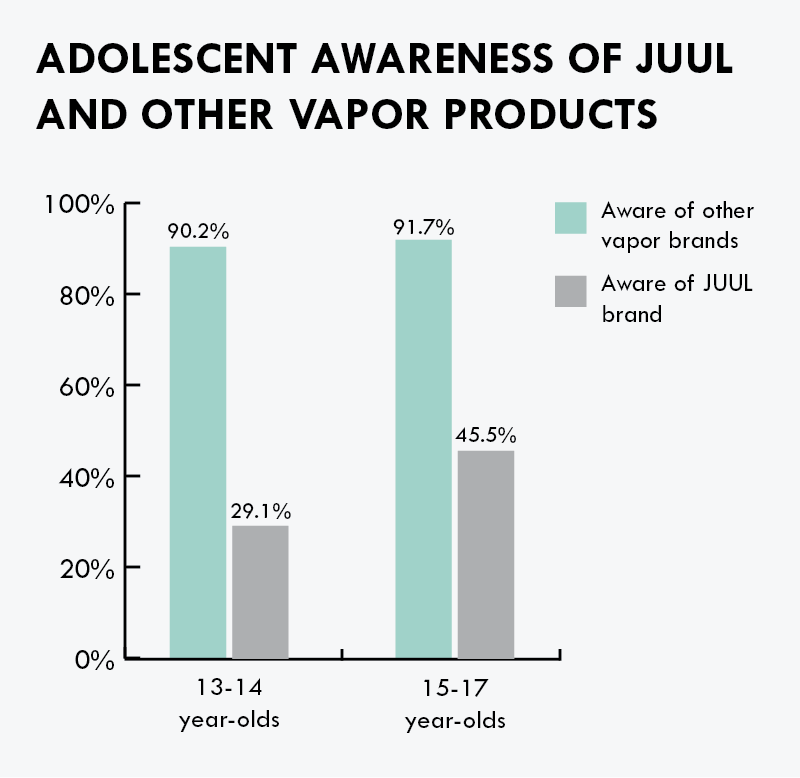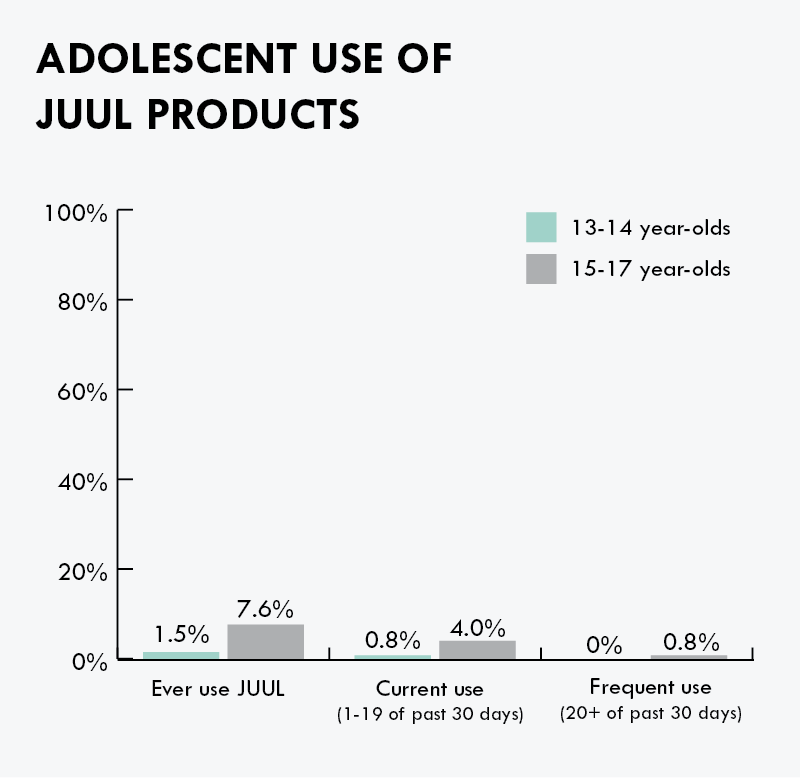AMERICAN JOURNAL OF HEALTH BEHAVIOR PUBLISHES STUDY MEASURING PREVALENCE OF AWARENESS AND USE OF JUUL AND OTHER VAPOR PRODUCT AMONG U.S. ADOLESCENTS
Research & Analysis
May 6, 2019
JUUL Labs issued a statement regarding a behavioral study published in the American Journal of Health Behavior investigating the prevalence of awareness and use of JUUL products among a representative sample of U.S. adolescents, aged 13–17 years. This study was conducted as part of the company’s expansive scientific program to better understand youth-use patterns and develop effective measures to reverse the reported increase in youth use of vapor products, including JUUL.
The study, a cross-sectional, self-complete online survey conducted between Sept. 21, 2018 and Oct. 3, 2018, included a nationally-representative probability sample of 1,017 U.S. adolescents aged 13-17 years. JUUL Labs commissioned and funded the Centre for Substance Use Research (CSUR) and GfK Global Research (now IPSOS) to independently design, administer, and analyze the results for this study. JUUL Labs did not have access to the raw data or exert control over the study.
CSUR, GfK and JUUL Labs met with FDA to discuss the design, conduct, and implementation of the study, and survey questions were adapted from federally-funded tobacco surveys, including the National Youth Tobacco Survey and Wave 1 of the Population Assessment of Tobacco Control (PATH) survey. The study assessed both awareness and self-reported use of the JUUL device, other vapor products, and combustible cigarettes. Researchers received both parental and participant consent before administering the study, and the study protocol and survey instrument were reviewed and approved by an Institutional Review Board.
It is important to note that the U.S. vapor-based e-cigarette market now includes not only a large number of illegal, unlicensed JUUL-plug-compatible products (cartridges that are not manufactured, licensed or sold by JUUL Labs, but said to be compatible with the JUUL system), but also pod-based systems designed to closely resemble the JUUL system. The study did not capture what percentage of self-reported use of a JUUL product was with a product manufactured by JUUL Labs versus copycat or counterfeit products (both vaporizers and pods) manufactured by unrelated, third-party companies — or simply devices mistakenly believed to be a JUUL product by the respondents. JUUL Labs continues to aggressively go after the manufacturers of these illegal products, which are often marketed in kid-appealing flavors that differ drastically from the company’s limited product offering, through legal action and engagement with regulatory authorities.
Adolescent awareness of JUUL products
Approximately 90.3% of adolescents aged 15-17 years and 88.6% of adolescents aged 13-14 years had ever seen or heard of an e-cigarette before this study. By comparison, 45.5% of 15-17 year-olds and 29.1% of 13-14 year-olds recognized the JUUL brand or product specifically.
Adolescent use of JUUL products
Researchers also assessed prevalence of use among self-reported JUUL product users, including ever use, current use (defined as use on 1-20 days of the past 30 days) and frequent use (defined as use on 20-30 of the past 30 days).
Approximately 7.6% of those aged 15-17 years and 1.5% of those aged 13-14 years reported ever use of a JUUL product. By comparison, 18.4% of 15-17 year-olds and 8.4% of 13-14 year-olds reported ever use of anye-cigarette.
Approximately 4% of those aged 15-17 years reported current use of a JUUL product, with 0.3% reporting frequent use. 8.7% of this age group reported current use of any e-cigarette and 0.8% reported frequent use.
Approximately 0.8% of adolescents aged 13-14 years reported current use of JUUL products, with no measurable frequent use among this age group. 1.5% of this age group reported current use of any e-cigarette and, similar to JUUL product use, researchers found no measurable frequent use of e-cigarettes generally.
Use of flavors
Among 15-17 year-olds who indicated current JUUL use, Mango was the most commonly reported ‘flavor used most often’ in the past 30 days, followed by Fruit and Mint, respectively. Overall, 2.2% of adolescents aged 15-17 years had ever used a JUUL product andstarted with Mango flavored JUULpods, and 2.3% of adolescents aged 15-17 years had used Mango flavored JUULpods in the past 30 days.
“Peer-reviewed research helps illuminate key issues regarding underage use of vapor products and is vital to informing the formation of long-term, effective solutions,” said Kevin Burns, CEO at JUUL Labs. “We commissioned this study as a first step to assessing underage use of our products and we believe more research on youth prevalence and perception of all vapor products, including JUUL, is needed. This survey data was collected before implementation of our Action Plan last November, including our decision to stop the sale of non-tobacco and non-menthol-based flavored JUUL products to traditional retail. The study results underscore the importance of category-wide actions to fully address and prevent underage use of vapor products, including JUUL, and we stand in strong support of the FDA’s draft guidance restricting the sale of certain flavored products, including JUULpods, at retail outlets and online. The next youth prevalence study we are sponsoring is currently out in the field, and we look forward to sharing those results with the FDA, scientific community and general public once finalized. We remain committed to eliminating underage use of JUUL products, while preserving access for adult smokers seeking a true alternative to combustible cigarettes.”
About the Study
JUUL Labs commissioned and funded the Centre for Substance Use Research (CSUR) to independently design, administer, and analyze the results for this study. Participants between the ages of 13 and 17 whose parents are panelists of the GfK’s KnowledgePanel were selected through a nationally-representative probability sample. The GfK’s KnowledgePanel is the largest probability-based online research panel in the U.S. designed to be representative of the non-institutionalized U.S. population aged 18 years and older. The survey took roughly 20 minutes to complete and each individual received $25 for their participation. The study protocol and survey instrument was approved by Advarra Institutional Review Board. CSUR will administer an identical survey to a similarly sized probability sample of US adolescents aged 13-17 years in April and May of 2019.
Other Posts
October 25, 2024
ROBYN GOUGELET DELIVERS REMARKS DURING A PUBLIC MEETING HOSTED BY FDA AND NIH
On October 21, Juul Labs’ Vice President of U.S. Regulatory Affairs, Robyn Gougelet, delivered remarks during a joint public meeting hosted by the U.S….
March 17, 2023
JUUL LABS PUBLISHES WHITE PAPER EXAMINING THE REAL-WORLD IMPACT OF ENDS PRODUCTS FOR ADULT SMOKERS
In a new white paper entitled “The Real-World Impact of ENDS for Adult Smokers: Tobacco Harm Reduction Through Real-World Data and Evidence,” Juul Labs has reviewed and compiled the latest science and evidence demonstrating the positive real-world impact of ENDS products for adult smokers.
March 17, 2022
PEER-REVIEWED STUDY FINDS BANNING VAPOR PRODUCTS MAY LEAD TO INCREASED CIGARETTE SALES
This research shows that policies that significantly restrict vapor products are likely deterring current adult smokers from switching and driving former adult smokers back to combustible cigarettes, which remain the leading cause of preventable death in the U.S. and worldwide.


